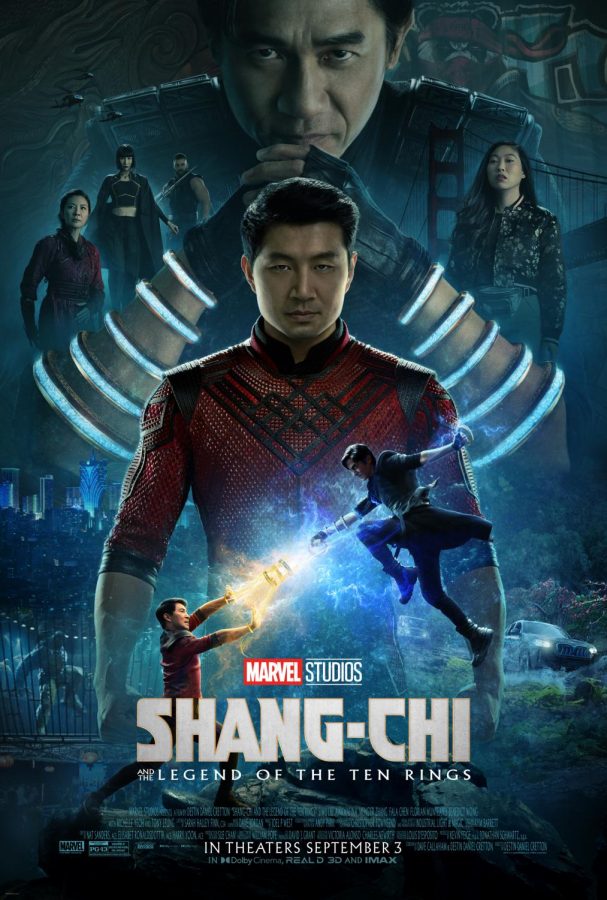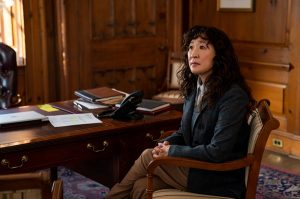Marvel’s Shang-Chi and the Legend of the Ten Rings Exceeds Expectations
September 8, 2021
It’s rare for a movie, especially from a studio as ubiquitous as Marvel, to live up to excessive hype, but Shang-Chi and the Legend of the Ten Rings does it. It tells the tale of a young man in California, whose life is upended when everything he once ran away from comes blazing back. He returns to China, facing his father for the first time in years, and finds himself on an action-packed journey to the mythological village his mother supposedly came from.
As Marvel’s newest release, Shang-Chi has had a lot of hype surrounding it. It’s the first movie in the Marvel Cinematic Universe to feature an Asian protagonist, as well as one of the only American movies to feature an almost entirely Asian cast. It is also the second movie to be released in Marvel’s post-Endgame “Phase Four.”
From flashy fight scenes to comedic-relief side characters, there’s plenty of classic superhero-movie fare to go around. However, Shang-Chi is more than just a cookie-cutter action movie.
It gives us some of the deepest Marvel characters we’ve seen yet, with a morally gray villain, complex character dynamics, and relatable familial connections. It draws inspiration from Chinese mythology as well as the modern day, immersing us in a vibrant, culturally-rich world that appreciates both parts of Shang-Chi’s identity: his Chinese roots and his life in San Francisco.
Extensive knowledge of Marvel lore isn’t required to understand its storyline, which, while following the basic structure of any superhero movie, manages to dive deeper than you would expect.
That isn’t to say that this movie isn’t without its flaws. The CGI, while impressive, was overused at times, dimming the performance of an impressive cast. The storyline arguably goes heavy on the backstory. It had an opportunity to dive into much deeper, much more interesting waters by considering mental health, but opted not to. Although, Marvel movies aren’t known to be philosophical masterpieces.
Of the cast, Tony Leung, who plays Shang-Chi’s villain Wenwu, delivers a particularly exceptional performance. Even as the villain, who also happens to be Shang-Chi’s father, he portrays a character impossible to hate.
Awkwafina, though recently controversial over her appropriation of Black culture (namely, her “blaccent”), is funny as Katy. Thankfully, the relationship shared between Katy and Shang-Chi remains entirely platonic, providing refreshing and much-needed representation of close friends of opposite genders.
Shang-Chi also succeeds in representing Asian and Asian-American culture. With a mostly Chinese cast, plus a few Malaysian, American, and British actors, the only Hollywood blockbuster’s cast that compares is 2018’s Crazy Rich Asians. Shang-Chi gives Asian audiences much-deserved representation in the superhero genre, which is among the most inspirational for young children.
Up until recently, superhero films in Hollywood were astoundingly white. Marvel’s recent strides with Black Panther, The Falcon and the Winter Soldier, and now Shang-Chi, have given POC superheroes leading roles for the first time. This has also led other studios, namely DC Comics, to begin to explore POC leads in their own productions.
That said, studios attempting POC representation will sometimes do more harm than good. In The Falcon and the Winter Soldier, for example, only one of the two protagonists is Black, and the few other Black characters are heavily stereotyped. The show, despite having a race-heavy premise, avoids the most candid conversations about racial issues in America until its very end. Shows and movies can inadvertently reinforce harmful stereotypes through their characters, which is why studios need to be more conscious about their representation moving forward. Still, any representation is an improvement, and the more of it there is the better it will be.
With so much riding on its shoulders, Shang-Chi and the Legend of the Ten Rings had the potential to be disastrous. However, it wasn’t. It represents a step forward for Marvel, both in their timeline and in their quest for diversifying the superhero field, and it manages to do so in a way that doesn’t sacrifice the elements you expect from a Marvel movie.























